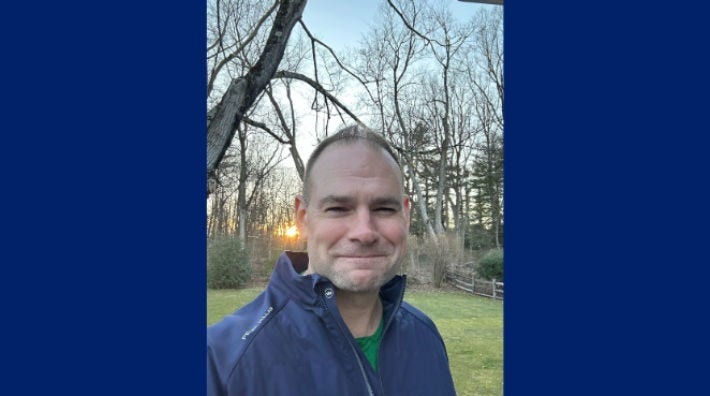After Leading a Screening Awareness Campaign, Colonoscopy Becomes Personal

Andy Whitehouse is someone who understands messaging. As a communications executive, a political communications professor at Columbia University School of Professional Studies, and a former British public health official, he’s built a career on helping others find the right words to inspire people to action.
Which is what makes his own colonoscopy story such a teachable moment.
An advocate for screening, but overdue himself
Andy had already spent years working closely with colon cancer prevention advocates. He co-authored a national strategy for awareness and even helped launch the viral “Lead From Behind” campaign with Ryan Reynolds and Rob McElhenney. But Andy, then 46, still hadn’t gotten his own colorectal screening yet.
“I was thinking about it all the time,” he says. “I had every reason to do it. I just hadn’t gotten around to it.”
It wasn’t fear. It wasn’t doubt. Sometimes, life just gets in the way. In Andy’s case, it was a diagnosis of a rare autoimmune disease, the pandemic, and work. Andy was putting off a screening he knew he should have scheduled sooner rather than later.
His friend Brooks Bell, who had been diagnosed with Stage III colon cancer at just 38, had been urging him to go. And Andy had recently learned that one of his grandparents had died of colon cancer, giving him a family connection to the disease.
So, finally, he booked the appointment.
Following his own advice
Andy’s colonoscopy prep experience was unremarkable, something he calls “not a super fun time, but certainly much better than it used to be, based on what I’ve heard from others.” The procedure itself also went smoothly, but the results surprised him.
His doctor detected and removed two polyps during the colonoscopy. Pathology showed that one was a type of polyp known to be a precursor to cancer. It was large, flat, and harder to detect than some other types of polyps. It was also found to be pre-cancerous, meaning it needed to be removed completely so that it did not develop into cancer.
Although Andy’s polyp hadn’t yet turned cancerous, it was nearly the same size as the tumor his friend Brooks had when she was diagnosed with Stage III cancer.
“It was a fairly scary little moment,” Andy says. “It wasn’t cancer. But it very well could have been. So having the colonoscopy turned out to be quite a good thing.”
Why finding a colon polyp matters
Many people can have polyps and, like Andy, have no symptoms. A polyp can take as many as 10 to 15 years to develop into cancer. Experts are not sure exactly how or why colorectal polyps grow or what causes them to change from non-cancerous cells into cancer.
While polyps are common, they can be detected and removed before they have a chance to turn into cancer. For people at average risk for colorectal cancer, this is one reason to get your first screening at the age the American Cancer Society recommends: 45.
Colonoscopies are unique in that they are the only colon cancer screening test that uses a tiny camera to visualize the entire colon. A colonoscopy not only detects polyps, but it allows most polyps to be removed in real time, known as a polypectomy. This means colonoscopy can help prevent cancer, as removing polyps can mean reducing risk. One reason the overall death rate for colorectal cancer has dropped is that colorectal polyps are more often found by screening and removed via colonoscopy before they can develop into cancers.
Or, in Andy’s words, “That’s the magic of a colonoscopy. You take out something before it ever has the chance to turn into something worse.”
Since his first screening, Andy has been considered to be at a high risk for colon cancer, so he’s been on a yearly screening schedule. Doctors found more polyps at his next screening, which means he’ll have many more colonoscopies in his lifetime.
Changing the way we talk about colonoscopies
Andy wishes that colonoscopies were no longer seen as scary or mysterious, but rather as an amazing tool of modern medicine. “People don’t like talking about colonoscopies,” Andy says. “But we should. They should be on everyone’s radar, because they’re powerful, and they save lives.”
The movement to normalize routine colorectal cancer screening is gaining urgency. The facts are clear. Colorectal cancer is now the third most commonly diagnosed cancer and the third most common cause of cancer-related death in both men and women in the United States. It ranks second in cancer-related deaths overall and is the leading cause of cancer deaths in men younger than 50 years of age.
A preventable cancer still claims too many lives
Still, not enough people are getting screened. Unfortunately, about 1 in 3 people in the United States who should get tested for colorectal cancer have never been screened. According to the American Cancer Society's Colorectal Cancer Facts and Figures 2023-2025, 38% of adults ages 45 years and older were not up to date with colorectal cancer screening in 2023. Colorectal cancer screening rates were lowest in people 45-49 years old.
Why exactly many people under 50 are not getting screened is unclear, but it could be because they don’t understand the known risk factors or their personal risk of colorectal cancer. Or they’re not aware of the recommended age to start routine screening. Cost can be another concern, as they may have inadequate health insurance coverage. Factors like fear and stigma also certainly play a role, which is why it’s so important that getting regular screening tests becomes a normal part of our everyday conversations.
Andy, for one, is certainly relieved that he finally went. “If I hadn’t done it,” he says, “who knows?”
So if you’re 45 or older, don’t let life get in the way. Talk to your doctor. Schedule your colonoscopy. And if someone you love is putting it off, be the nagging friend that Brooks Bell was to Andy Whitehouse.
Because sometimes, one recommended health screening really could change everything.
Learn more
Additional resources from the American Cancer Society:
- Reviewed by

The American Cancer Society medical and editorial content team
Our team is made up of doctors and oncology certified nurses with deep knowledge of cancer care as well as editors and translators with extensive experience in medical writing.
American Cancer Society news stories are copyrighted material and are not intended to be used as press releases. For reprint requests, please see our Content Usage Policy.



